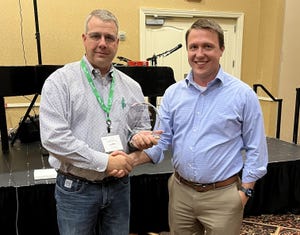Cactus Family Farms, The Maschhoffs detail their business models, outlook for the 'Cornhusker State.'

The second largest privately-owned cattle feeding company in the country is extending an invitation to farmers in Nebraska to join them in raising protein to feed the world. However, the Amarillo, Texas-based Cactus Feeders isn't focused on seeking beef production partners right now, but rather pork producers.
"As many people know we're in beef production, but a lot of people don't know we've moved into hog buying with Heinold Hog Markets and also pork processing with the WholeStone Farms plant in Fremont, Neb.," says Rod Leman, Cactus director of business development.
Cactus Family Farms, the pork production division of the 100% employee-owned Cactus Feeders, is one of 220 independent producers that own a piece of the Fremont plant. On the hog production side, Cactus owns 35,000 sows throughout South Carolina, Georgia and Iowa. They market around 850,000 hogs per year and will be growing their sow base in 2021. The company plans to add 7,500 sows to their operation to advance their mission this year alone and are seeking to add 40 new wean-to-finish barns to their operation by the fall of 2021, either through new construction or with existing facilities.
"We're really excited about that and that's one of the reasons we're eager to continue our work in Nebraska with wean-to-finish partners," Leman says.
One of the largest family-owned pork production networks in the United States also has their eyes set on Nebraska for potential production partners. The Maschhoffs, based in Carlyle, Ill., currently has 35,000 sows near Cambridge and Arapahoe, Neb., and have packer commitments with Smithfield Foods in Crete, Neb. Now the pork production system is looking for some pig space to help fill that gap, says Carl Jacobson, business development manager for The Maschhoffs.
"We send a lot of pigs to Iowa every year to come back to Nebraska, so if we can keep those pigs in Nebraska, eating Nebraska corn, that's a long-term goal of The Maschhoffs," Jacobson says.
Both Jacobson and Leman, who detailed their company's contract grower programs during the virtual Nebraska Pork Expo last week, say it's an ideal opportunity for those farms looking to bring back the next generation or want to add value to their grain business.
"It's an incredible way to diversify the farming operation, whether it's bringing back the next generation or just adding that extra entity that makes the next step of growing a family operation, that'll provide a stable long-term return with very little risk," Jacobson says. "I think that's something that's very unique about the contract-feeding model. The Maschhoffs are taking the risk of the highs and lows of the market, whether we're in a pandemic or whatnot, and then obviously the fertilizer provides a natural hedge and competitive advantage for row crop producers."
Cactus is offering up to a 15-year contract for construction of a new 2,450-head wean-to-finish building, complete with a top industry pig space payment. In addition, Cactus is offering a financing program that will enable contract growers to take advantage of swine barn ownership with a low initial down payment, while preserving the standard cash flow benefit of owning a barn.
"The best part about this contract is it's a stable monthly payment, regardless if the barn has pigs, so if we have a production problem, you're still going to get paid and then one of the things that's new for this year is we have an exclusive low down payment financing program where you can get into this barn for as little as a $45,000 down payment," Leman says. "This 5% down payment provides the same operating cash flow as if you had put 20% down on the barns."
The Maschhoffs is offering up to 15-year contracts on wean-to-finish sites and $43 per space on 2,400 spaces annually. Jacobson says something that sets the pork production system apart from other integrators is it offers an incentive program.
"Truly what you put into this barn is what you're going to get back out of it," Jacobson says. "We offer a number of incentive programs for our partners, which includes a wean pig stocking program and a value share marketing program. On average, these incentive programs add an additional $6 per space over a 2,400-head barn. When you factor this in, partners have an opportunity to earn $50 or more per space annually."
Both Jacobson and Leman say the contract grower program is a genuine partnership.
"As the contractor, you would own the barn and maintain the barn and the site. You care for our pigs daily. You load the pigs in and out of the barn. You communicate with us on pig scheduling concerns that you have. You keep records and report on activity, and then of course you retain and apply the manure to your crop ground, which is one of the big value propositions here," Leman says.
"We pay you, the contractor, for the barn and your services. We own the pigs, so you have no market risk, no feed price risks. We provide training and support for the contractor on pig production, pig care, everything you need to be successful. Then we pay for anything that goes in or on a pig, so we pay for feed, transportation, vaccines, medications, marketing services, logistic services, veterinary services, lab fees, needles, disinfecting, anything that goes in or on a pig, and of course, then we give you feedback on the pig performance from your barn."
In addition to providing those services, The Maschhoffs also offers local support through their regional production managers and has a sister company in-house that can do the permitting and manure management plans and Jacobson says, these models can help save on cost and get things pushed through efficiently.
"This is truly a partnership that we want to have, so we're certainly not going to leave anybody hanging and we want to be able to make sure everyone's successful in this whole project," Jacobson says.
Leman acknowledges for outsiders looking in, with COVID-19 supply chain disruptions and the backlog of hogs, putting up a 2,450-head wean-to-finish barn and entering into a 15-year contract may seem risky. However, through the COVID-19 challenges, Cactus has been better positioned than some producers, able to divert pigs to other plants they work with, in addition to the WholeStone plant being able to absorb extra deliveries on Saturdays and Sundays.
"We've been through some very trying times recently, and it just highlights the advice that I give to most people when they do this project," Leman says. "As a contractor, you're not really betting on the hog industry so much as you're betting on the production partner that you're with, the financial stability of the production partner you're with, because hogs are going to be raised in the Midwest."
About the Author(s)
You May Also Like





